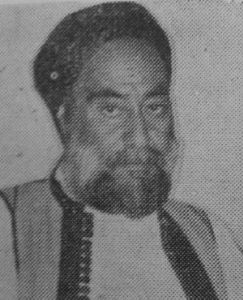A Short Tribute
Hacham Haim Hacohen, son of Kalfa, was born on 26 Kislev 5669 (1909) on the island of Djerba in Tunis. He began his Torah studies with Hacham Machluf Idan. In 1961 he left for Tripoli, Libya, and eventually returned to Djerba to serve as rabbi of the city of Medenin, succeeding Hacham Hayuto Houri, who had immigrated to the Land of Israel. He studied ritual slaughter and became a licensed shochet. When the community shrank, after most of its members immigrated to Israel, Hacham Haim Hacohen moved to Tunis to work as a shochet.
The Muslim population's hostility towards the Jews increased after the Six Day War of 1967 and, in 1971, Hacham Haim Hacohen moved to Israel with his family. They settled in Beer Sheva, and he dedicated himself to his writing.
Hacham Haim Hacohen passed away on 27 Kislev 5735 (1974) and was buried in Beer Sheva. He wrote She'erit Haim, a book on the weekly Torah Reading portions.
A few quotes from the Rabbi on 'Traditions of the Fathers' in which he teaches that the Generation of the Flood did not survive for Noah's sake because he walked in the attribute of justice
"Noah was a righteous man; he was blameless in his age; Noah walked with God". The Midrash Raba that says, "When the storm passes the wicked man is gone' refers to the Generation of the Flood and 'But the righteous is an everlasting foundation' refers to Noah." End quote. We should inquire what this Midrash is meant to teach us. For if Noah was righteous and an everlasting foundation, why did the Generation of the Flood not survive for his sake? "Noah walked with God" comes to tell us that despite Noah's being righteous and an everlasting foundation, the world did not exist for his sake, for he walked among his generation with the attribute of Justice.
He did not ask that they be pitied at all, and did not want to yield any of his credit to them and be punished as they were, as did Abraham with the ten generations. He sought the annihilation of the Generation of the Flood, as did the Holy One, who said, "I have decided to put an end to all flesh", which is why it says, "Noah walked with God". It means he walked among those of his generation of one mind with the Holy One, Who comported Himself with them with the attribute of Justice, and so did Noah, who did not ask that they be pitied at all.
Sheerit Israel, Breishit Reading Portion, pp. 4-5, Zohar Printing, Tel Aviv, 1986
